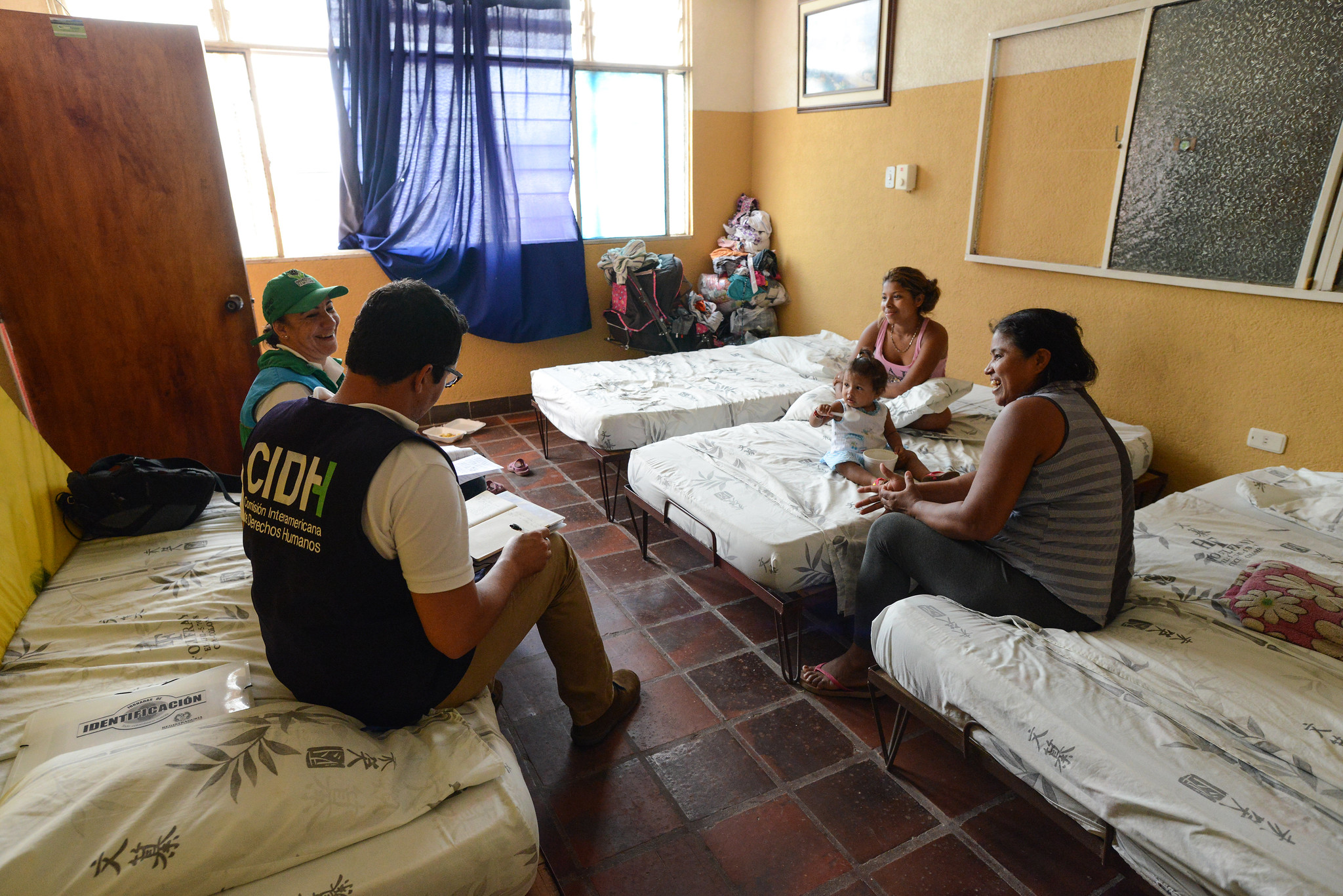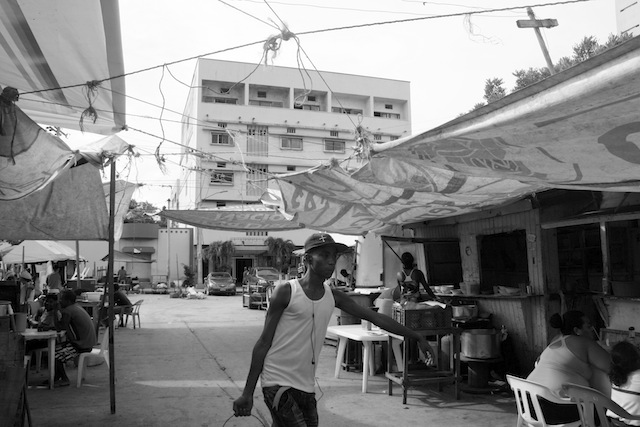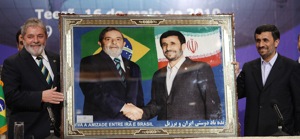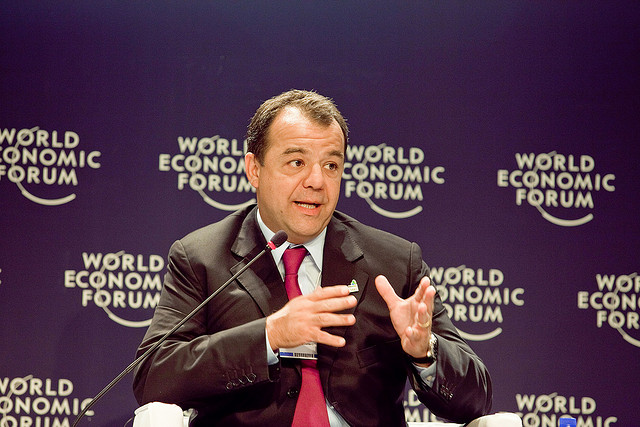
Colombia, Features
Colombia’s Disgraced DAS and President Uribe’s Uncertain Legacy
May 20, 2010 By Roque Planas
Uribe’s military successes, marketed under the now ubiquitous title of “Democratic Security,” endeared him to the electorate and in 2004 he was reelected, following a referendum removing the prohibition against serving consecutive terms. Had the Constitutional Court not rejected another referendum this year to allow Uribe a third, consecutive term, polls indicate he would have won again handily.
But not everyone approves of Uribe’s methods. Uribe has ramped up the war against the FARC with a dogged with-me-or-against-me attitude that he uses as a foil against criticism. When Ecuadorian President Rafael Correa condemned the Colombian military’s airstrike against the FARC on Ecuadorian soil, Uribe responded by accusing Correa of taking money from the guerrillas. When the press reported that the Colombian military had killed several people in poor neighborhoods and dressed them up as guerrillas in order to inflate combat statistics, Uribe said lawyers on the payroll of unspecified international organizations were filing false claims to undermine the military’s credibility.
Hollman Morris is intimately familiar with Uribe’s low tolerance for criticism. In a country where security concerns often deter journalists from venturing into the countryside, Hollman and his brother Juan Pablo pride themselves on taking their cameras into the farflung areas most devastated by the conflict. They call their show “Contravía,” the Spanish term for going the wrong way down a one-way street.
In early 2009, Hollman Morris traveled to southeastern Colombia to interview FARC leaders for a documentary. While there, Morris accepted an invitation to interview three hostages who were about to be released. Realizing the hostages had been coerced into talking to him, Morris says, he only asked their names and how long they had been in captivity. He never aired the footage.
Uribe responded with outrage, accusing Morris in a press conference of hiding behind his role as a journalist “to be a permissive accomplice to terrorism.” Then-minister of defense and current presidential candidate Juan Manuel Santos echoed the allegation, saying Morris was “close with the guerrillas.”
Uribe and Santos did not, however, have any proof. “We see this as very serious, because it can cause the journalist’s death,” Lauria of the CPJ said, referring to baseless government statements linking Morris to the FARC. “Making these accusations without any kind of evidence is irresponsible.”
The DAS was aware of the lack of evidence. Around March of this year, Hollman Morris obtained from a journalist friend of his what appeared to be the cover sheets of a series of plans to attack Morris’ and others’ credibility by disseminating false evidence of links with leftist guerrillas. The documents have been circulated widely among Colombia’s press and Adam Isacson of the Center of International Policy has posted them on his blog, Plan Colombia and Beyond.
One sheet outlines a plan to “initiate an international smear campaign” against him, using “comuniqués” and “inclusion in a FARC video.” The document also recommends suspending Morris’ visa, presumably to the United States. The papers carry the insignia of the DAS, along with its motto “Loyalty, Courage, Honor.”
Morris said in an interview over Skype that he has left the country more than 20 times due to death threats, some of which came from the DAS. When asked if his security had improved with the exposure of the DAS’ criminal acts, he said that as long as President Uribe “continues to stigmatize the Colombian political opposition and human rights defenders, we have no reason to feel safe.”
Hollman Morris was not the only person named in the recently publicized papers. The documents refer to several other Colombian personalities and DAS operations, all presumably targeted by a department within the DAS called the “Subdirectory of Operations for Political Warfare.” Its methods included coordinating smear campaigns through Internet chatrooms, publishing and distributing pamphlets, and creating Web sites. One section, titled “Strategies,” speaks enigmatically of “Terrorism: Explosive, incendiary, public services, technology.” In a subsection, titled “Pressure,” the document reads “Threats, blackmail.”
The documents contain instructions to connect at least five prominent opposition politicians to illegal armed groups or drug trafficking. For two others, they recommend different tactics—“WILSON BORJA: Generate sentimental infidelity (i.e., adultery rumors). SAMUEL MORENO: Demonstrate relationship to financial embezzlement.” Another file recommends mounting a smear campaign against five Constitutional Court Justices.
Duque is not mentioned in the files that have been made public, but the José Alvear Restrepo Lawyers’ Collective appears in a reference to an “Operation Arauca,” (the name refers to the Colombian city that lies along the Venezuelan border). The mission’s objective was to “establish ties” between the collective and the Ejército de Liberación Nacional (ELN), a guerrilla group. “STRATEGIES: Sabotage. ACTION: Exchange message with ELN leader, which will be found during a search of the premises.”
While the details remain sketchy, the goal of these campaigns is eerily clear: “Results – Disinform the population that supports detractors of the Government. Generate Division within opposition movements. Impede the materialization of public acts convoked by the opposition.”
***
“We were horrified by this,” Lisa Haugaard of the Latin America Working Group (LAWG) in Washington said in a telephone interview. “It’s widespread illegal surveillance, and then there’s these dirty tricks on top of it, which are still being uncovered.”
The scandal is disturbing not only because of the cold frankness of the DAS’ instructions, but because the evidence points increasingly toward the manipulation of the DAS for political ends.
It is possible that the agency’s criminal behavior is rooted in the actions of a few renegade administrators, such as Jorge Noguera, who approached their mission to snuff the guerrilla insurgency with excessive enthusiasm. But as the investigation continues, it appears that the executive may have played a greater role than it admits. “Almost any high functionaries from the Palace (i.e., the Executive) can call here and ask for any kind of favor without even needing to ask the director,” an unidentified DAS official told Semana in 2009. “They call the chief of intelligence, the head of counterintelligence, or the Operations Director and ask for what they need, it doesn’t matter what.” According to the source, such favors often backfired, since the DAS would, in turn, monitor the person asking for the favor in order to have a “control.”
Supreme Court Justice Jaime Arrubla publicly accused the presidency of complicity, noting that DAS functionaries do not act on their own, but rather on the orders of their director, who, in turn, reports to the Casa de Nariño—Colombia’s White House. “This was a conspiracy of the State against the Supreme Court.” Arrubla told La W, a popular radio news program in Colombia.
Extrapolating executive orders from the structure of the bureaucracy is not the same as proving it with evidence, however. “It’s the classic Watergate questions: what did Uribe know and when did he know it? Or did he personally order it?” Adam Isacson of the Center for International Policy in Washington said in a telephone interview. “It’s getting ever closer to Uribe and to (Uribe’s advisor) Bernardo Moreno, but if the Fiscalía has a smoking gun, they haven’t made it public.”
Whether or not Uribe is personally implicated in the investigation, it is remarkable that he has come away from the scandal relatively untainted. Isacson says that if a similar scandal had occurred in the United States, it would have prompted an impeachment—not so in Colombia. “There’s been a slow-moving investigation and Uribe has worked to maintain his deniability, but it’s pretty late in the game. Uribe’s out of office in three months. That’s not to say he might not face problems with the Colombian justice system later on, but it’s too late for impeachment really.”
While impeachment proceedings are unlikely, some Colombians still demand a more thorough investigation. “I mean, it’s the entire government—the entire equivalent to CIA, that’s what the DAS is—working to persecute a person, to harrass them and to discredit them. That’s just unacceptable and unimaginable,” Colombian political analyst Claudia López said in an interview in New York City, referring to the DAS’ treatment of Hollman Morris.
“So far it has not been proved that the president himself gave such orders. But somebody at the highest level of the presidential house gave that order, because the DAS doesn’t take actions without orders from the executive,” López said. “That’s unacceptable, that’s criminal, and that has to be prosecuted until the highest level if we want to protect freedom of speech and democracy in Colombia.”
Uribe’s legacy hangs in the balance. His military victories against the FARC made him the most popular Colombian politician in recent memory and promise to define his presidency. Those victories may allow the Colombian government to consolidate its control over the national terroritory for the first time in generations. But if the DAS scandal reaches Uribe, his presidency may also come to symbolize the upending of the rule of law and the degradation of the institutions that many Colombians had believed, perhaps too idealistically, were immune to corruption by an unending war that has come to define their political life.






13 Comments
Had any such systematic spying on every branch of government, journalists, courts, prosecutors, opposition leaders, human rights organizations, etc., including the facilitation of disinformation and even assassination campaigns, been alleged against the Venezuelan government, it would be on the front pages and leading the op-ed pages of every single American daily.
But since it’s the close ‘ally’ of the conservative Uribe government of Colombia, this systematic abuse of power (with the nonsensical presumption of Uribe’s clean hands via Reaganite ‘plausible deniability’) gets downplayed and every time Hugo Chavez looks at somebody or says something else pompous and ridiculous, it’s major news.
[…] A special report on Colombia’s DAS intelligence service’s plan to disinform the public, impede political opposition and intimidate the country’s citizens. […]
[…] special report on Colombia’s DAS intelligence service’s plan to disinform the public, impede political opposition and intimidate the country’s […]
[…] Colombia’s secret police and Uribe’s legacy […]
[…] Morris, a journalist whose investigative reporting on the connections between paramilitary violence and poli… in war-torn Colombia has earned him and his family repeated death threats, was denied a visa this […]
[…] the Uribe administration fared poorly in the realm of human rights. Colombia’s intelligence service, known as the DAS, has spied on and, in some cases, threatened opposition politicians, journalists […]
[…] to know how ugly it got? Here’s an article about a victim of the DAS death threats and intimidation from the Latin America News […]
[…] will come speak about what “freedom” of the press looks like in Colombia. As the Latin America News Dispatch reports, “Hollman Morris is intimately familiar with Uribe’s low tolerance for […]
[…] well-known Colombian journalist will come speak about repression of the press in Colombia. As the Latin America News Dispatch reports, “Hollman Morris is intimately familiar with Uribe’s low tolerance for […]
[…] See: Colombia’s Disgraced DAS and President Uribe’s Uncertain Legacy. […]
[…] Ex-President of Colombia Álvaro Uribe’s then-Chief of Staff Bernardo Moreno was sent to jail on Saturday for alleged involvement in the DAS scandal. […]
[…] Colombia’s DAS was disgraced two years ago, after it was revealed that the agency had spied on the Supreme Court, opposition politicians, human rights groups and journalists. The new documents indicate that the illegal spying was even more widespread than previously suspected. […]
[…] Read more from the Associated Press and learn about the DAS’ background in this piece from the Latin America News Dispatch. […]
Comments are closed.